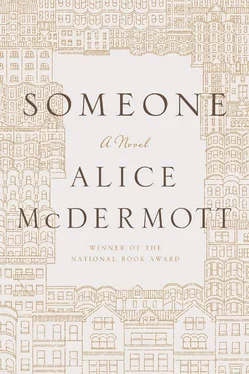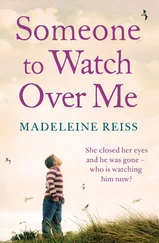Alice McDermott
SOMEONE

A Novel
Pegeen Chehab walked up from the subway in the evening light. Her good spring coat was powder blue; her shoes were black and covered the insteps of her long feet. Her hat was beige with something dark along the crown, a brown feather or two. There was a certain asymmetry to her shoulders. She had a loping, hunchbacked walk. She had, always, a bit of black hair along her cheek, straggling to her shoulder, her bun coming undone. She carried her purse in the lightest clasp of her fingers, down along the side of her leg, which made her seem listless and weary even as she covered the distance quickly enough, the gray sidewalk from subway to parlor floor and basement of the house next door.
I was on the stoop of my own house, waiting for my father. Pegeen paused to say hello.
She was not a pretty girl particularly; there was a narrowness to her eyes and a wideness to her jaw, crooked teeth, wild eyebrows, and a faint mustache. She had her Syrian father’s thick dark hair, but also the permanent scattered flush, just under the fair skin, of her Irish mother’s broad cheeks. She had a job in lower Manhattan in this, her first year out of Manual Training, and, she said, she didn’t like the people there. She didn’t like a single one of them. She ran a bare hand along the stone balustrade above my head. The other, which lightly held the strap of her purse, wore a dove-gray glove. She’d lost its partner somewhere, she said. And laughed with her crooked teeth. Fourth pair this month, she said.
And left the library book she was reading on the subway yesterday.
And look, tore her stocking on something.
She lifted her black shoe to the step where I sat and pulled back the long coat and the skirt. I saw the laddered run, the flesh of Pegeen’s thin and dark-haired calf pressing through between each rung. The nail of the finger Pegeen ran over its length was bitten down to nothing, but the movement of her hand along the tear was gentle and conciliatory. A kind of sympathy for her own flesh, which I imitated, brushing my own hand along the unbroken silk of Pegeen’s stocking, and then over the torn threads of the run.
“Amadan,” Pegeen said. “That’s me. That’s what I am.”
She pulled the leg away. The skirt and the blue coat fell into place again. Across the back hem and up the left side of Pegeen’s good spring coat there was a long smudge of soot that I impulsively reached out to brush away. “You’ve got some dirt,” I said.
Pegeen turned, twisted her chin around, arm and elbow raised, trying to see what she couldn’t see because it was behind her. “Where?” she said.
“Here.” I batted at the dirt until Pegeen threw back her head in elaborate frustration, pulling the coat forward, winding it around her like a cloak. “I’ll be happy,” she said, slapping at her hip, “to stop going to that filthy place.” Meaning lower Manhattan, where she worked.
She paused, put her nose to the air in mock confidence. “I’ll get a boyfriend,” she said. She batted her eyelashes and drew out a sly smile. They were great kidders, the Chehabs, and no boyfriends, it seemed, had yet called for Pegeen. “I’ll get myself married,” she said, and then licked all at once the four tall fingers of the gloveless hand and swatted them against the dirty cloth.
“Amadan,” she said again. Which, she explained, was her mother’s word for fool.
And then she released the skirt of her long coat and, dipping her shoulders, shook herself back into it again. She reminded me of a bird taking a sand bath. “I fell down,” she announced. She said it in the same fond and impatient tone she had used to describe the lost glove, the forgotten library book. “On the subway.” It was the tone a mother might use, speaking about a favorite, unruly child.
Pegeen blew some exasperated air through her pooched-out lower lip. “I don’t know what the blazes makes me fall,” she said impatiently. “I do it all the time.” She suddenly squinted and the flush just under her downy skin rose to a deep maroon. She lowered her face to mine. “Don’t you dare tell my mother,” she said.
I was seven years old. I spoke mostly to my parents. To my brother. To my teachers when I had to. I gave some whispered response to Father Quinn or to Mr. Lee at the candy store when my mother poked me in the ribs. I could not imagine having a conversation with Mrs. Chehab, who was red-haired and very tall. Still, I promised. I would say nothing.
Pegeen shook herself again, standing back and lifting her shoulders inside the pale blue coat. “But there’s always someone nice,” she said, her voice suddenly gone singsong. “Someone always helps me up.” She struck another pose, coy and haughty, as before, her chin in the air. She touched the feather in her hat. “Today a very handsome man gave me his hand. He asked if I was all right. A real Prince Charming.” She smiled again and looked around. Just a few doors down, the older boys were playing stickball in the street. There was a knot of younger ones on the curb, watching. Bill Corrigan was in his chair on the sidewalk just behind them.
Pegeen leaned forward once more. “Tomorrow,” she said breathlessly, whispering now, “I’m going to look for him again. If I see him, I’m going to get real close.” She leaned down, her hand on the banister above my head. “I’m going to pretend to fall, see? Right next to him. And he’ll catch me and say, ‘Is it you again?’”
All human eyes are beautiful, but Pegeen’s were very black and heavily lashed and gorgeous now, with the sparkle of her joke, or her plan, or, perhaps, her vision of some impossible future.
She straightened up. “We’ll see what happens then,” she said, sly and confident, her thick eyebrows raised. She swung her purse slowly, turned to move on. “That will be something to see,” she said.
At her own house, Pegeen didn’t use the basement door, as usual. She climbed the stone steps, taking them one at a time, like a small child. At the top, she paused again to swat at the back of her coat, only touching the dirt with her wrist. It was early evening. Spring. I could see Pegeen’s reflection in the oval glass of the outer door—or at least the blue heart of the reflection, which was both the reflection of her good spring coat and the evening light on her flushed face. Pegeen pulled open the door and the thin image in the glass shuddered like a flame.
I turned back to the vigil I was keeping on the stone steps. Vigil for my father, who had not yet come up from the subway.
From the far corner, the neighborhood’s men and working women were coming home. Everyone wore hats. Everyone wore trim dark shoes, which was where my eyes fell when any of them said, “Hello, Marie,” passing by.
At seven, I was a shy child, and comical-looking, with a round flat face and black slits for eyes, thick glasses, black bangs, a straight and serious mouth—a little girl cartoon.
With my heart pinned to my father’s sleeve in those days.
The boys were playing stickball down the street. Always at this time of day. Some of them friends of Gabe, my brother, although he, young scholar, remained inside at his books. The younger boys were lined at the curb, watching the game, Walter Hartnett among them. He had his cap turned backward and the leg with the built-up shoe extended before him. Blind Bill Corrigan, who had been gassed in the war, was on the sidewalk just behind Walter, sitting in the painted kitchen chair that his mother set out for him every morning when the weather was fine.
Читать дальше













